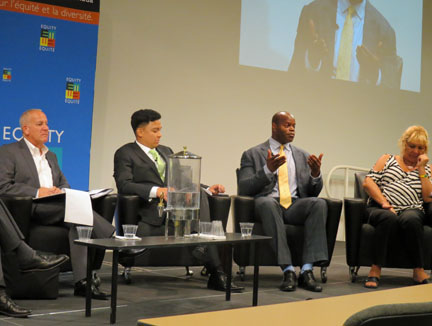As people celebrate Pride this weekend along with significant new United States Supreme Court rulings last week, it’s also a time to think about human rights for gays and lesbians both in Canada and around the world.

Here at home, recent changes to the refugee system have had a significant impact on gay and lesbian applicants in particular, says Michael Battista of Toronto’s Jordan Battista LLP.
“To its credit, the government has introduced initiatives that have reduced that processing time,” Battista told a Pride week discussion panel at the Law Society of Upper Canada this week.
But, he noted, there are downsides to new rules giving refugees just 60 days to get ready for their case. Lesbian and gay applicants, he suggested, need more time as they typically have less support from their communities. Often, he said, that community support is key to proving the facts of their case.
At the same time, new rules allowing the immigration minister to designate countries of safe origin “at the stroke of a pen” are problematic for gays and lesbians, he says. While some countries may be safe in general, they may still be dangerous for gays and lesbians. Battista gave the example of putting Jamaica on the list, a country some may think is reasonably safe that nevertheless has a bad record of protections for gays and lesbians.
Finally, Battista noted the issue of visas. With the government imposing visa requirements on countries that generate lots of asylum claims, it may mean many refugee applicants can’t get here in the first place.
While Battista spoke about some of the domestic issues, other panellists at the LSUC event focused on the international situation.
“It’s a lot easier to be short and Jewish in the Palestinian Authority than it is to be gay,” said Mark Berlin, a McGill University professor of practice and former director general for international law at the federal Department of Justice.
For Berlin, who noted his status as a “triple threat” as a short, Jewish, gay man, establishing basic governance structures is key to enhancing human rights, including for gays and lesbians, in failed and fragile states around the world. As a result, he touted the value of technical legal assistance, including training for prosecutors, as one way of asserting rights for gays and lesbians internationally.
But there has been progress on the international front, said Lee Waldorf, special adviser for women’s human rights at the Stephen Lewis Foundation. While the text of international treaties typically hasn’t made explicit reference to gay and lesbian rights, a significant body of jurisprudence recognizing them at the international level in areas ranging from asylum to freedom of expression has developed in recent years, according to Waldorf.
But at the national level, there have been setbacks, she noted, as certain countries have beefed up their legal restrictions.
One country with a particularly dark track record is Jamaica, according to Michael Charles, a lawyer and management consultant and principal at Change DeZign Consulting. Noting the “institutional consensus of discrimination in Jamaica,” Charles spoke about the range of social and legal obstacles there, including mob attacks, laws against homosexuality, and the reluctance of officials such as police officers to protect gays and lesbians.
While there are a couple of ongoing legal challenges in relation to those issues, Charles argued those interventions “have limited reach and scope.” But he did suggest Canadians have a role to play in improving the situation in Jamaica. First, he said, data and information collected by international human rights organizations can be helpful. In addition, he noted the significant trade between Canada and the Caribbean provides some room for action. In particular, he said Canadian companies active in the region should work to ensure respect for human rights policies there.

 Here at home, recent changes to the refugee system have had a significant impact on gay and lesbian applicants in particular, says Michael Battista of Toronto’s Jordan Battista LLP.
Here at home, recent changes to the refugee system have had a significant impact on gay and lesbian applicants in particular, says Michael Battista of Toronto’s Jordan Battista LLP.